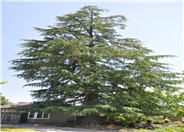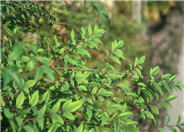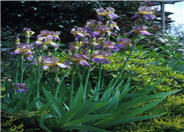
Common name:Deodar Cedar
Botanical name:Cedrus deodara
This fast-growing, coniferous evergreen is capable of reaching a size of 80' high by 40' wide. Its needles are a light, silvery green color, 2" long. Flowers are inconspicuous. Barrel shaped cones appear in fall and winter. Branches are pendulous and spreadings. Plant in area that has ample room for growth.

Common name:Amazing Red N.Z. Flax
Botanical name:Phormium 'Amazing Red'
Phormium 'Amazing Red' is an evergreen perennial. This plant has many swordlike, stiffly vertical leaves in a fan pattern, reaching 2' tall. Leaves are reddish brown. Flowers are insignificant and bloom infrequently. It does better with occasional watering once it's established.

Common name:Society Garlic
Botanical name:Tulbaghia violacea
This clumping perennial will grow less than 1' tall and has narrow, blue green leaves. Clusters of lavender flowers bloom in spring and summer. Leaves and flowers have a distinct onion or garlic smell if crushed.

Common name:Nandina, Heavenly Bamboo
Botanical name:Nandina domestica
Nandina domestica is a graceful upright shrub that grows from 3'-6' in height. It gets its name from its bamboo-like growth habit. When thinned from the center it bears a remarkable resemblance to bamboo. It is best used in groups. It can be used in a shaded patio or out in a shrub border with full sun. An interesting feature of Heavenly Bamboo is the bronze color in the new growth when planted in full sun. It also bears clusters of white flowers in the spring.

Common name:Bearded Iris
Botanical name:Iris Bearded Hybrids
This perennial will grow 1'-3' tall and has medium sized, blue green leaves with flowers of different colors that bloom in spring. It needs well draining soil and full sun. Many are fragrant and rebloom several times a year. Plant rhizomes in Sept or Oct. They need water once a week during the hot spells. Top dress with compost and gypsum in January and August.
Designer: Susan Stiltz
Photographer: GardenSoft
Maintain a two to four inch layer of mulch on the soil surface to reduce weeds, infiltrate rain water, and reduce compaction.
Drip and other smart irrigation delivers water directly to roots, allowing no excess water for weeds.